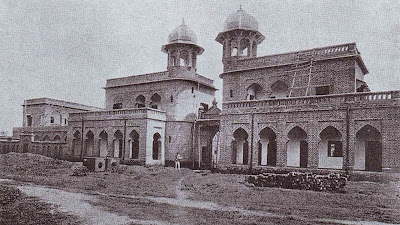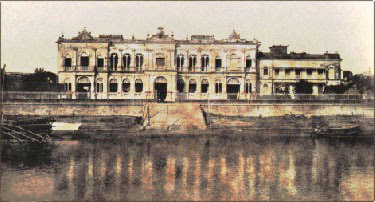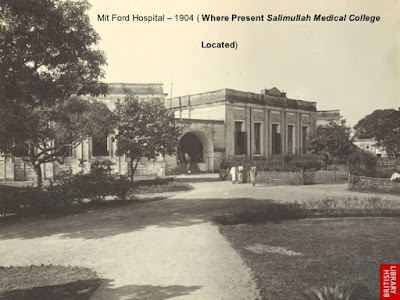Dhaka The Capital of Bangladesh
Dhaka formerly called Dacca is that the capital city and also the most important city of Bangladesh, in southern Asia. it is the ninth-largest, and also the sixth-most densely populated city within the planet, with a population of 8.9 million residents within the town limits, and a population of over 21 million residents within the Greater Dhaka Area.
Dhaka
is that the economic, political and cultural center of Bangladesh. it's one
altogether the foremost cities of South Asia, the foremost important city in
Eastern South Asia and among the Bay of Bengal countries; and one in every of
the foremost important cities among OIC countries.
The
town is stands beside the Buriganga River. It’s at the middle of
national government, trade and culture. Dhaka 17th-century old city was the
Mughal capital of Bengal. plenty of palaces and mosques still remain. American
architect Louis Khan’s National Parliament House complex typifies the large,
fast-growing modern metropolis.
The
area of Dhaka has been inhabited since the primary millennium. Town
rose to prominence within the 17th century as a capital and commercial center
of the Mughal Empire in South Asia. Dhaka was the capital of the
proto-industrialised Mughal Bengal for 75 years (1608–39 and 1660–1704).
Because the middle of the muslin trade, it had been one altogether the foremost
prosperous cities within the Indian subcontinent.
The
city was named Jahangirabad in honor of the Mughal Emperor Jahangir and hosted
the seat of the Mughal Subahdar, Naib Nazims and Dewans. Medieval Dhaka's glory
peaked within the 17th and 18th centuries, when it had been absolutely home to
the merchants from across Eurasia.
It
had been the middle of a flourishing trade attracting English, French,
Armenian, Portuguese, and Dutch traders. The Mughal decorated town with
well-laid out gardens, tombs, mosques, palaces and forts. Town was once called
the Venice of the East. Under British Empire, town had the introduction of
electricity, railways, cinemas, Western-style universities and colleges and up
to date facility.
It
became an important administrative and academic center in Eastern Bengal and
Assam after 1905 in 1947. After the tip of British rule; it became the manager
capital of Bangladesh. it absolutely was declared because the legislative
capital of Pakistan in 1962.
In 1971, it became the capital of an
independent Bangladesh. Article 5 of the Constitution of Bangladesh declares
Dhaka because the capital of the republic. Dhaka is that the financial,
commercial and so the entertainment capital of Bangladesh. It accounts for up
to 35% of Bangladesh's economy.
Since
its establishment as a up to date capital city the population, area, social and
economic diversity of Dhaka have grown tremendously. Dhaka is now one amongst
and also the foremost densely industrialized regions within the country.
Dhaka
could also be a serious international City, because it hosts the headquarters
of Several International cooperation’s. By the 21st century, it emerged as a
mega city, which is now listed as a beta-global city by the Globalization and
World Cities Research Network (GaWC). The Dhaka stock market has over 750
listed companies. The town hosts over 50 diplomatic missions and so the
headquarters of BIMSTEC. The city's culture is believed for its
cycle-rickshaws, cuisine, art festivals and spiritual diversity.
The
old Dhaka city has around 2000 buildings from the Mughal and British periods.
Structures just like the Bara Katra and Choto Katra, Lalbagh Fort, Tara Mosque
etc. Dhaka is on the eastern banks of the Buriganga River. Town stands on
Ganges Delta and about area of 306.38 square kilometres. Tropical vegetation
and moist soils characterize the land, which is flat and shut to water level.
This
leaves Dhaka liable to flooding during the monsoon seasons as a result of heavy
rainfall and cyclones. Dhaka is that the financial, commercial and also the
entertainment capital of Bangladesh. It accounts up to 35% of Bangladesh's
economy.
The
Globalization and World Cities Research Network ranks Dhaka as a beta-global
city. Town is home to the country's monetary authority, the Bangladesh Bank,
and also the biggest stock market, the Dhaka stock exchange. The town features
a growing people, driving the marketplace for contemporary consumer and luxury
goods. Restaurants, shopping malls and luxury hotels still function vital
elements within the city's economy.
Town has historically attracted numerous
migrant workers. Hawkers, peddlers, small shops, rickshaw transport, roadside
vendors and stalls employ an out sized segment of the population –
rickshaw-drivers alone number as many as 400,000. Half the workforce is
employed in household and unorganized labor, while about 800,000 add the
textile industry.










0 comments:
Post a Comment